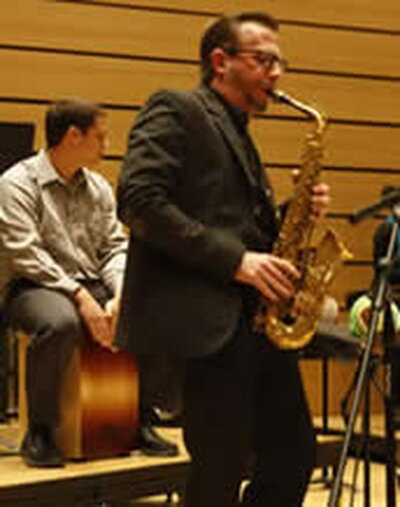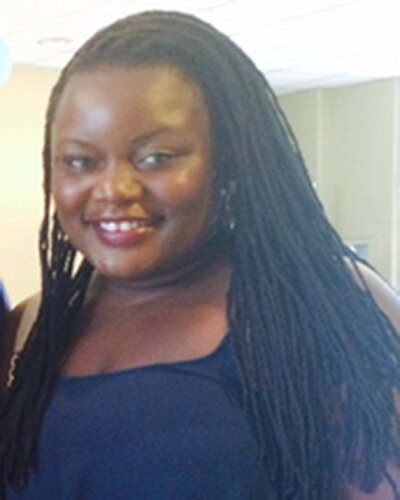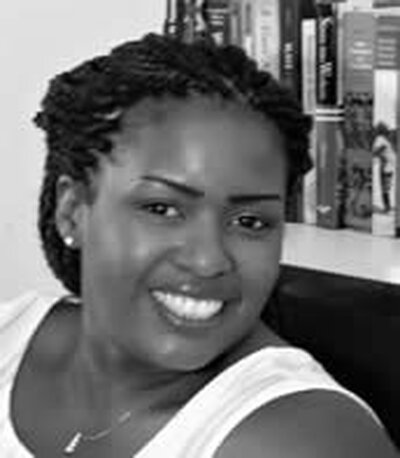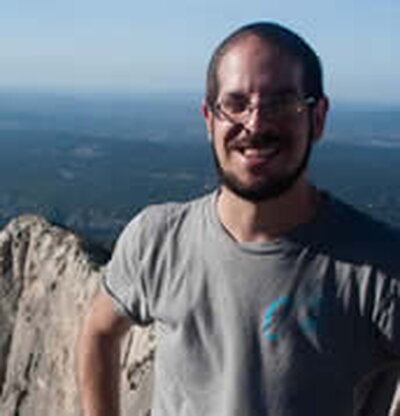
Dr. Richard M. Deja, PhD Musicology, 2016, and Former CAS FLAS Fellow
"Crossing Borders: The Intersections between Musician, Traveler, and Scholar"

During my travels in Southern Africa, I adopted various strategies to mitigate the fact that I was an outsider of obvious foreign origins. Most recently, I felt unsure about my role as an academic researcher, particularly in Malawi, a place where I began forging relationships as a young musician during several long-term stays in the 1990s. Being a musician is hardly a panacea in foreign relations, but I cannot deny the contribution of music in helping to subvert, at least partially, my role as scholar or my role as foreigner. Essentially, if a musician can positively add to a musical event or experience, then it is a win had by all. In the sharing of reward, there is also a sense of sharing risk—as in a failed performance or being undervalued by a club owner. This idea of sharing, particularly across various social boundaries, is one that I consider integral to African studies, and one that has continued to accompany me regardless of disciplinary focus.
Under the auspices of a Fulbright-Hays DDRA, I carried out research for my dissertation on how music making and the music industry, evermore transnational in nature, affected subjective belonging among musicians in Malawi and southern Africa in terms of cultural citizenship and other community ties. Thankfully, musicianship lends itself well to participant-observer methodology by placing emphasis on the participatory aspect. I cannot dismiss the privilege afforded to me as a white foreigner, but perhaps in these instances those aspects were temporarily suspended by a practical skill set that operated in a shared performance space. It seemed best, then, to contribute via similar channels, so I helped organize a concert at a leading venue in Blantyre that led to a continued concert series for the musicians I shared the marquee with. I also conducted interactive workshops on methods for music composition and improvising and delivered lecture performances at University of Dar es Salaam in Tanzania and WITS University in South Africa.
After completing my fieldwork, I took a position as visiting assistant professor at Earlham College. I was new to the liberal arts college environment, but found it particularly rewarding. Earlham is notable because it is founded on Quaker principles of consensus governance and egalitarian values. Students and faculty operate on a first name basis to minimize hierarchical relationships implied by titles like Doctor and Professor. Students are keen to discuss difficult issues and many are active in social justice and environmental causes. My experience was highlighted by participating in student concerts and faculty recitals. In one instance, I presented my own compositions on guitar while being accompanied by the faculty percussion instructor. This experience in particular proved to be a great opportunity to discuss my experiences in southern Africa and how the social and musical influences permeate my own compositions. I was intrigued with the variety of mostly positive reactions. They ranged from statements asserting that it sounded more like Peter, Paul and Mary than African, to testimonies of fond nostalgia from a student who grew up in Zambia. In any case, these types of interactions greatly enhanced my work in the classroom.
After completing my PhD this year, I am currently serving as Visiting Lecturer in Musicology here at U of I, teaching courses on music research and world music, among others. I am also working on course design and implementation for Rutgers Arts Online through Mason Gross School of the Arts. My focus in each of these contexts is essentially teaching the discipline of musicology as it relates to musical practices locally and around the world, to undergraduate and graduate students majoring in music and other disciplines. I love the idea of reaching students in various fields because it gives me a sense that the knowledge will continue across disciplinary boundaries and, I hope, have a broader positive impact.
In essence, I try to utilize my overlapping personae—musician, traveler, and scholar—in the spirit of interdisciplinarity and interaction as a means of crossing social and cultural boundaries in what I hope to be mutually beneficial ways.
Telamisile Phumlile Mkhatshwa, MA African Studies, 2015

Ms. Telamisile Phumlile Mkhatshwa was a student at the Center for African Studies, University of Illinois Urbana-Champaign. She graduated with a Master of Arts in African Studies and a Minor in Gender and International Development in May 2015. She is also a Fulbright alumnus who is passionate about literary studies and issues pertaining to the welfare of women in developing countries. After completing her graduate studies in the US she returned to her home country, Swaziland, where she landed a fulltime lecturing position at the University of Swaziland, Department of African Languages and Literature. She teaches African literature, currently focusing on Swazi oral literature. Her master’s thesis research was on how Swazi women use both oral and written literature to debate marginalization and patriarchal inconsistencies. In general, her research interests include the relationship between literature and development, that is, how far both oral and written literature can be used to understand underprivileged women in developing countries and influence policy development, thus improving the livelihood of women. She looks forward to doing more research in her area of interest.
Telamisile has also ventured into business. She is the co-director of TELSA Translating and Editing Consultants which is a company that provides translating, editing, interpreting, and proof reading services in Swaziland. She started the company in order to bridge the communication gap that exists between different classes of Swazis and Swazis and the international world. Though the company is relatively new, she hopes that it will continue to grow. During her spare time she enjoys travelling, meeting new people, reading the Bible, and sharing her Christian beliefs.
Letitia Onyango, BA Liberal Arts and Sciences and Undergraduate Minor in African Studies, 2010

Letitia Onyango is currently a researcher at Northwestern University's Feinberg School of Medicine. Last year, she joined a three-person team focused on the experiences of Black women in biomedical PhD programs. Their work, titled "Being the Only: Black Women's Perception, Biomedical Graduate Student Perceptions of Climate & Coping," was recently presented at the National Institute of Health's Conference on Evidence-Based Innovations to Support Women in Biomedical Research Careers. In the upcoming manuscript, Letitia will lend her expertise in African Studies to identify the differences in experiences of African & Afro-Caribbean immigrant students.
In addition to her work at Northwestern University, Letitia will also be taking a group of young men of color to South Africa in July and August as part of a partnership between the Experiment in International Living and The Fellowship Initiative (a program of JP Morgan Chase). Letitia will lead students in attending workshops at the African Leadership Academy about entrepreneurship and leadership. The students will also visit Robben Island to learn about the history of apartheid, and be challenged to identify parallels between activism during apartheid and activism in their own communities.
Morgan Hollie, BA Global Studies; Undergraduate Minor African Studies, 2015; and Former FLAS Fellow

Morgan Hollie (left) with Dr. Barro at the 2015 Illinois Undergraduate Research Symposium
Morgan Hollie is currently a Program Assistant for the Migration Policy Institute’s (MPI) National Center on Immigrant Integration Policy. Her work at MPI is focused on issues relating to refugee resettlement and the economic and educational outcomes of immigrants and refugees. Prior to working for MPI, she traveled to Senegal as a FLAS Fellow to further her Wolof studies. While in Senegal, she was a research intern for the Dakar-based democracy and human rights organization Rencontre Africaine pour la Défense des Droits de l’Homme (RADDHO) where she focused on democratic movements across West Africa and assisted in tracking political events throughout the region. She also assisted in the planning of a demonstration at the Burkinabé consulate in Dakar, Senegal in October 2014 in solidarity with the popular Burkinabé uprising that ousted former President Blaise Compaoré. While in Senegal, she also conducted research for her capstone project comparing the development of democracy in Mali and Senegal and each country’s respective responses to conflict.
In February 2017, Ms. Hollie will pursue further research on Senegalese democracy as a Fulbright scholar. Her study will examine the female founders and activists associated with Y’en a Marre (Enough is Enough), a Senegalese political movement founded by journalists and artists, and the broader implications of their involvement for the role of women in West African politics. Upon her return to the United States, she plans to pursue a master's degree concentrating on African political development.
Dr. Hill-Yates, MA African Studies, 2006; PhD Sociology, 2012; and Former CAS FLAS Fellow

Erica Alane Hill-Yates graduated from the Department of Sociology at the University of Illinois in 2012 and from the Center for African Studies in 2006. Dr. Hill-Yates is an assistant professor at Delaware County Community College (DCCC) in Pennsylvania where she teaches a number of courses including Sociology of Race, Cultural Anthropology, and Marriage and the Family.
Before beginning her current tenure-track position at DCCC, Erica taught at Bard High School Early College in Newark, New Jersey where she was awarded the Highly Effective Teaching Award. Committed to helping students develop into well-informed and conscious global citizens, Dr. Hill-Yates was awarded an experiential learning grant in spring 2016 from DCCC. This grant supported travel of 80 Introduction to Sociology students to the United Nations Headquarters in New York City. The UN visit complemented student projects which focused on the UN Sustainable Development Goals.
Dr. Hill-Yates strives to be a scholar who brings her enthusiasm for Africa and its diasporas to the classroom and beyond. Her research interests include feminist theory, motherhood in the African diaspora, emancipation, and memory studies. She has published in the journal Race, Gender and Class and is currently working on an article about the reemergence of the African continent as a subject of analysis among hip hop artists such as Kendrick Lamar who hails from her hometown of Compton, California. In November 2015, she presented a paper titled “Who am I to Africa?: Black American Identity, Memory and Notions of Belonging on the African Continent” at the African Studies Association annual conference in San Diego where she was able to reconnect and reminisce with colleagues and close friends made during her time at the Center for African Studies.
In June 2011, Erica married fellow Illini, Brian J. Yates (PhD, History, 2010) and the two welcomed a son, Malkam Jean-Benjamin Yates, in March 2014. Erica and her family currently live in Philadelphia and spend most weekends experiencing all that the City of Brotherly Love has to offer.
Dr.Tim Mahrt, PhD. Linguistics, 2015, and Former CAS FLAS Fellow

Tim Mahrt on La Saint- Victoire, Aix-en-Provence, France
Tim Mahrt started work in October 2015 as a postdoctoral researcher at the Laboratoire Parole et Langage—a laboratory that conducts multi-disciplinary research on language—in Aix-en-Provence, France. There he is working under a grant project titled Social Interaction in the Representation of Language headed by James Sneed German. Tim’s research interests involve how speech intonation is used to convey information and how listeners perceive this information. Under this new project, he is investigating the interaction between social factors such as gender, social class, or ethnic identity and the perception of intonation.